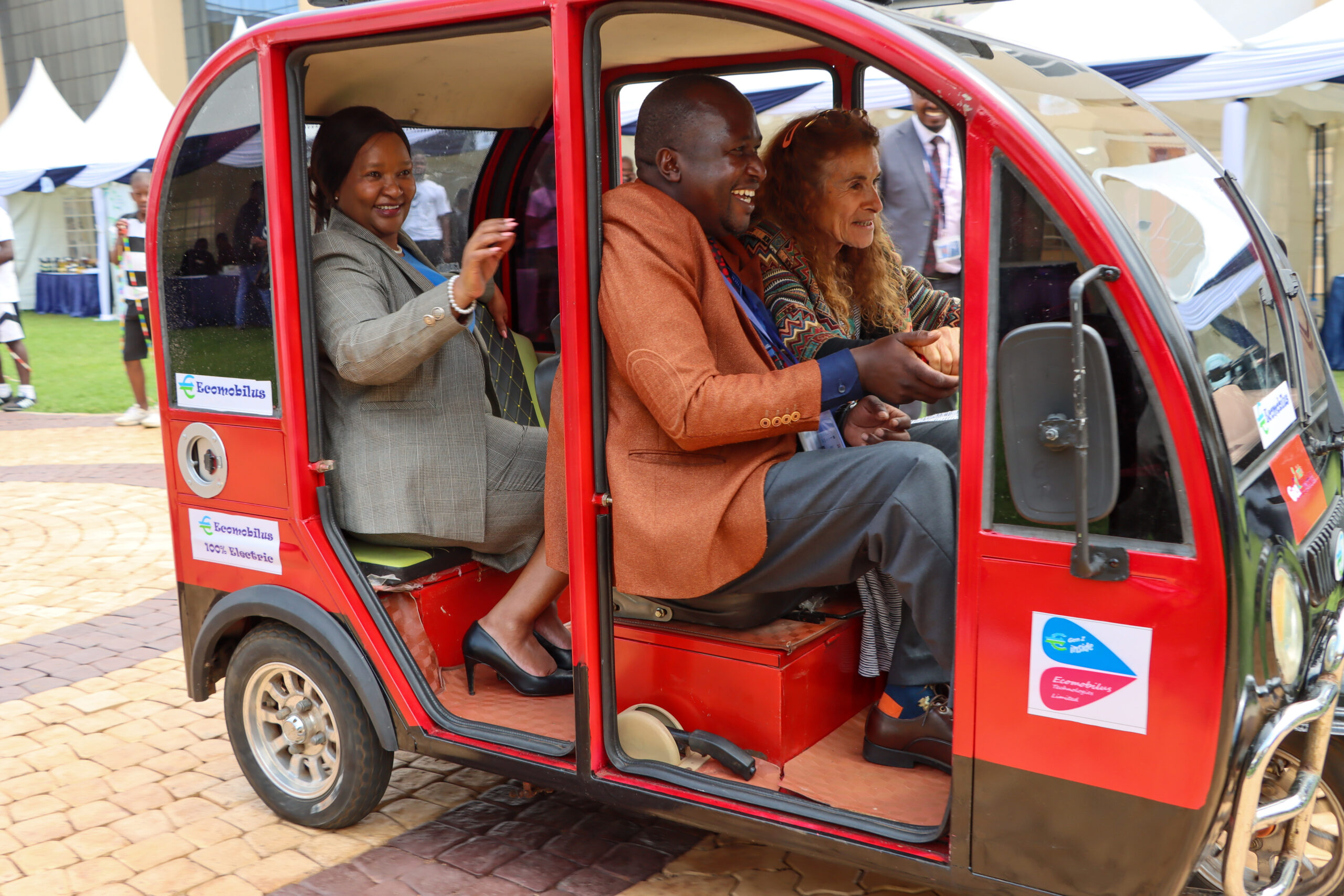Zetech University has unveiled an electric powered tuk-tuk presenting a significant step towards radically improving the sector and reducing carbon emissions.
Prof Gitau Kamau, a lecturer at the University says the engine less tuktuk runs on electric motors and has rechargeable batteries that can last for more than 100 km.
It has solar panels Integrated across its roof to harness solar energy which charges the batteries.
He says it is built like other tutuks though its faster with a speed of over 60 km/hr. It’s priced slightly higher than the normal tuktuks at Ksh450, 000.
“We have assembled the tuktuk, put in electric motors and solar panels to recharge its batteries once they get drained. It is noiseless, cost effective and clean,” said Prof Gitau during the University’s Innovation week.
He says his motivation is to provide an efficient, cost-effective and eco-friendly transportation, reducing reliance on conventional fuels and minimizing environmental impact.
“The vehicle doesn’t use fuel thus reducing carbon emissions as well as making it cost effective during this time when the cost of fuel is high,” he said.
The innovation is yet to be released into the market with Gitau decrying high cost of e-mobility equipment used to assembly the vehicle as a major challenge in the mass production of the small vehicles.
To make it cheaper for the manufacture of the tuktuks, Prof Gitau calls on the government to come up with policies that support adoption of e-mobility and ensure elimination of excise duty on body parts including steel, batteries and other accessories.
He also wants the government to set aside spaces in the Special Economic Zones for the assembly of body parts.
“The tuktuks are made of steel which is quite expensive. If only its cost and that of other accessories can be lowered, the mass production of the tuktuks can be cheaper and easy,” the Prof said.
He also called on the county governments to allow the TukTuks to park and operate freely within CBDs they are not a nuisance and will bring a lot of benefits to the carbon credit trading.
“E-mobility is the way to go and the government has been categorical that by 2027, most of the vehicles will be electric. In order to achieve this, there should be policies in place that support e-mobility,” Prof Gitau said.
In another groundbreaking innovation, Francis Nganga, a student in Zetech University pursuing Diploma in Electrical and Electronic Engineering has invented an Advanced Face Recognition system that aims to replace manual identification methods with a more efficient and secure solution.
This Technology has a High-precision algorithm to accurately identify individuals, reducing errors associated with manual checks. It has a Rapid processing capability to handle large volumes of students, enhancing convenience with improved security through biometric data, safeguarding against identity theft and unauthorized access.
Nganga says the system falls under the vast biometric technology that uses various parts of the body as identification keys with the most common biometric identification mechanism being the fingerprints.
He says the technology scans people’s face, eye (iris) to ascertain their identity.
He has developed the prototype in three main phases which were research and ideation phase, development phase (prototype development) and testing phase.
He says the biometric system is machine learning based, an important aspect of Artificial Intelligence. This means that the system is fed with data, and uses that data to perform tasks while simultaneously learning as it executes its assigned tasks.
He says using the technology; students will not need to always carry their identification cards.
READ ALSO:
Parents urged to pay school fees promptly to aid smooth flow of services
To market the innovation, the young innovator calls on stakeholders including schools, security organizations and banks to buy into the innovation to enhance their security systems.
The engineering student also urged fellow young innovators to familiarize themselves with copyright laws to ensure their creative ideas are trademarked to prevent theft and malicious use of their innovations.
Zetech Deputy Vice-Chancellor Professor Alice Njuguna applauded the innovators saying the University has set up a kitty to support them.
Professor Njuguna said that the success of these projects highlights the university’s commitment to fostering innovation and providing students with the resources and support needed to develop impactful technologies.
Recently, former Investment, Trade and Industrialization Cabinet Secretary Rebecca Maino said the country expects to have moved fully towards the use of electric buses by 2027 in line with the government’s agenda of transforming the transport sector through the reduction of carbon emissions to address the negative effects of climate change.
She said the Ministry has launched the Draft National Electric Mobility Policy that proposes the establishment of incentives meant to increase the uptake of electric vehicles including the reduction of excise duty on electric powered vehicles to 10% as in the Finance Act, 2023.
Other efforts, she said, are the revision of the Integrated National Transport Policy (2009) to accommodate electric vehicles and the requisite infrastructure as well as the development of an Automotive Policy to stimulate the assembly and manufacture of vehicles, with a specific focus on electric vehicles.
By Kamau Njoroge
You can also follow our social media pages on Twitter: Education News KE and Facebook: Education News Newspaper for timely updates.
>>> Click here to stay up-to-date with trending regional stories
>>> Click here to read more informed opinions on the country’s education landscape






